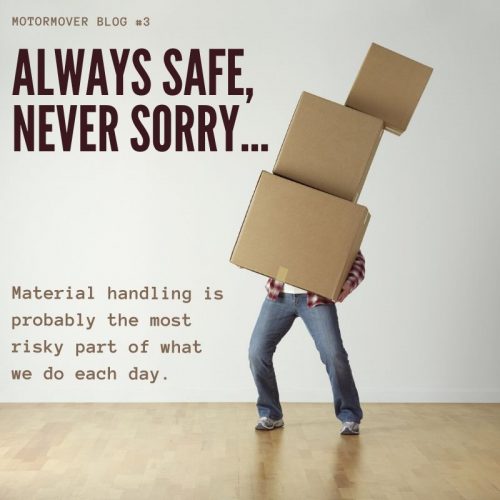Because promoting the wellbeing of workers, customers and the environment is at the heart of what we do, the prevention of accidents is always a priority for us. These priorities are particularly live at present for all of us in manufacturing. A recent report from the UK Warehouse Association (UKWA) has raised concerns for workers in factories and warehouses which are stockpiling in order to mitigate against any negative impact of Brexit.

The Issue
The workers’ union Unison reports that manual handling is the cause of 1 in 3 workplace accidents, making it the most common cause of accidental injury in the workplace as a result. Because it’s such a regular part of most jobs, material handling is probably the most risky part of what we do each day. Therefore, both employers and employees should have a very clear idea of the risks posed by material handling in their own workplace.

The Law
By law, employers are required to reduce any risk of injury from manual handling operations to “the lowest level reasonably practicable.” This includes making sure that you have appropriate equipment at your disposal to reduce any risk on everyday tasks.
If that equipment requires training or licenses, then only those with up to date qualification should use it. In addition, the machinery must be kept in good working condition, properly maintained, and tested on a regular basis. This makes larger pieces of kit, such as forklifts expensive to run and expensive to staff. As a result, they can be pushed into service just because they’re there.

The Solution?
A fork lift truck is often seen as the best solution to handling requirements. All Forklift manufacturers are clear however, that you should only use these vehicles for specified jobs. When money has been invested in such an expensive piece of kit, it is tempting to press it into action as much as you can, but this too is not advisable.
For example, the Fork Lift Truck association notes that “Most fork lift trucks are not designed to tow as part of their function. If a tow hook or bar is fitted it is probably there to aid recovery and not to tow a trailer. It is strongly recommended that a fork lift truck is not used for towing without first checking the suitability of the truck, and probable restrictions, with the manufacturer.”
If your forklift is not in pristine condition, then every scrape, scratch and bump was, in effect, a near-miss accident that required recording, reporting and addressing. In other words, is it really the right equipment for the everyday tasks you use it for and the staff that are carrying them out?

The way forward…
Common sense and the right equipment
Most moving of parts happens under the pressures of productivity and it is too easy to use the equipment and people that are present, rather than wait for the right kit and trained personnel to do the job correctly.
Above all, to make the shopfloor safe, there has to a clear permission in the workplace for staff to use the most practical tool at their disposal – common sense.
Having the right equipment for them to make use of that common sense will make a huge contribution to workplace wellbeing, as well as ensuring money spent is money well used.
If this raises questions about your workplace, please do get in touch with us. We’d be happy to help.
SOURCES:
